初中英语 人教版八年级下unit4 Why don't you talk to your parents知识点总结复习资料
八年级英语人教版下册Unit4Whydon'tyoutalktoyourparents教学设计
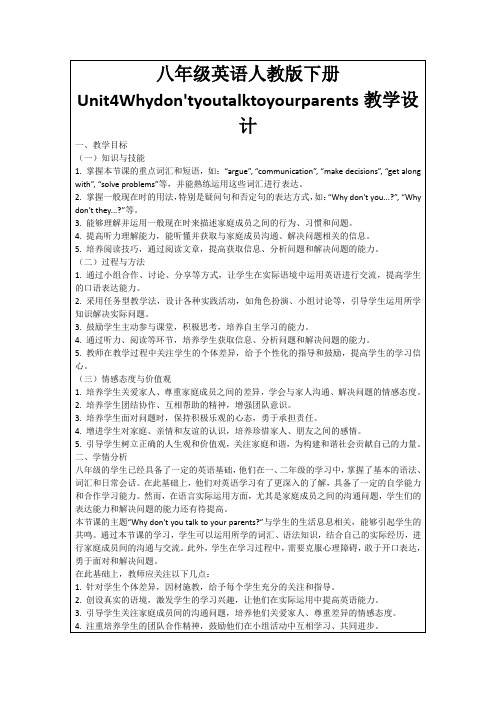
(4)巩固:通过听力、阅读练习,帮助学生巩固所学知识,提高听力和阅读能力。
(5)拓展:鼓励学生课后观察和思考家庭成员之间的沟通问题,尝试用英语与家人进行有效沟通,将所学知识运用到实际生活中。
3.教学评价设想:
5.引导学生树立正确的人生观和价值观,关注家庭和谐,为构建和谐社会贡献自己的力量。
二、学情分析
八年级的学生已经具备了一定的英语基础,他们在一、二年级的学习中,掌握了基本的语法、词汇和日常会话。在此基础上,他们对英语学习有了更深入的了解,具备了一定的自学能力和合作学习能力。然而,在语言实际运用方面,尤其是家庭成员之间的沟通问题,学生们的表达能力和解决问题的能力还有待提高。
5.教师在教学过程中关注学生的个体差异,给予个性化的指导和鼓励,提高学生的学习信心。
(三)情感态度与价值观
1.培养学生关爱家人、尊重家庭成员之间的差异,学会与家人沟通、解决问题的情感态度。
2.培养学生团结协作、互相帮助的精神,增强团队意识。
3.培养学生面对问题时,保持积极乐观的心态,勇于承担责任。
4.增进学生对家庭、亲情和友谊的认识,培养珍惜家人、朋友之间的感情。
(1)形成性评价:关注学生在课堂活动中的表现,鼓励学生积极参与,给予及时的反馈和指导。
(2)终结性评价:通过单元测试、口语表达等形式,全面评估学生的学习效果。
(3)个性化评价:针对学生的个体差异,给予个性化的评价和指导,激发学生的学习兴趣和自信心。
四、教学内容与过程
(一)导入新课
1.教师展示一幅家庭成员争吵的图片,引导学生观察并思考:“What is happening in this picture? Can you guess why they are arguing?”
人教版八年级英语下册Unit 4 Why don’t you talk to your parent

1. Why don’t you talk to your parents? 为什么不跟你的父母谈谈呢?
【自主领悟】(1)Why don’t you do sth. ? 这是一个否定疑问 句, “为什么不……? ”常用来征求意见和提出建议, 相当于 Why not do sth. ? 句式。例如: Why don’t you go with us? = Why not go with us? 为什么不同我们一起去呢? (2)talk to sb. 意为“同某人谈话”。例如: He talked to me about my study. 他跟我谈了关于我的学习的事情。
Unit 4 Why don’t you talk to your parents?
Section A (1a-2d)
Ⅰ. 短语互译 1. get enough sleep 2. have a fight with sb. 3. look through 4. hang out 5. 把……归还给…… 6. 允许某人干某事 7. 成功地发展; 解决 答案: 1. 有足够的睡眠 2. 跟某人打架 3. 浏览 4. 闲逛 5. give. . . back to. . . 6. allow sb. to do sth. 7. work out
【归纳拓展】allow的不同搭配 (1)allow sth. /doing sth. 允许(做)某事 例如: We don’t allow eating in the classroom. 我们不允许在教室里吃饭。 (2)allow sb. sth. (双宾语)给予某人某物 例如: He allows his son too much money. 他给他儿子太多的钱。
speak to sb. “跟某人讲话”
英语八年级下册Unit4-Why-don't-you-talk-to-your-parents-全单

with sb.
What’s the problem/the trouble? 并能讨论所给出的建议。
Do you have any problems in your daily life?
What problems do you have?
How do you solve them?Give some advice.
the ball game.
the phone.
Pair work
2c Role-play a conversation between Peter and his friend.
A: What’s the matter, Peter? B: I had a fight with my best friend.
so that you can say
surprise him.
you’re sorry.
d. I’m not good at
4.You could go to his
writing letters.
house.
e. I don’t want to
5.You could take him to
talk about it on
1. I have to study too much so I don’t get enough sleep.
2. I have too much homework so I don’t have any free time to do things I like.
3. My parents don’t allow me to hang out with my friends.
with sb.
What’s the problem/the trouble? 并能讨论所给出的建议。
人教新目标版英语八下Unit4《Whydon’tyoutalktoyourparents》说课稿

人教新目标版英语八下Unit 4《Why don’t you talk to your parents》说课稿一. 教材分析人教新目标版英语八下Unit 4主要讨论了如何与父母沟通的问题,通过本节课的学习,学生能够掌握一定的沟通技巧,提高与父母交流的能力。
本单元的主题贴近学生的生活,有利于激发学生的学习兴趣和积极性。
二. 学情分析根据我对学生的了解,他们在学习过程中已经掌握了基本的英语语法和词汇,具备一定的听说读写能力。
但部分学生在与父母沟通方面存在一定的困扰,可能因为害羞、害怕被批评等原因而不愿意与父母交流。
因此,本节课的教学目标在于帮助学生克服这些障碍,提高他们的沟通能力。
三. 说教学目标1.知识目标:学生能够掌握本节课的重点词汇和句型,如“Why don’tyou…?”,“Because…”等,并能够运用这些词汇和句型进行简单的交流。
2.能力目标:学生能够通过听力、口语、阅读和写作等多种方式,提高自己的英语应用能力。
3.情感目标:学生能够认识到与父母沟通的重要性,学会尊重和理解父母,提高与父母相处的质量。
四. 说教学重难点1.重点:本节课的重点是让学生掌握并运用句型“Why don’t you…?”和“Because…”进行交流。
2.难点:如何帮助学生克服害羞、害怕被批评等心理障碍,提高他们与父母沟通的勇气和信心。
五. 说教学方法与手段1.任务型教学法:通过设计各种真实的任务,让学生在完成任务的过程中运用所学知识,提高英语实际应用能力。
2.情境教学法:创设各种与父母沟通的情境,让学生在模拟实践中学会如何与父母交流。
3.小组合作学习:通过小组讨论、分享等方式,促进学生之间的互动,提高他们的合作能力和沟通能力。
六. 说教学过程1.导入:通过一个关于父子间沟通的小故事,引发学生对与父母沟通的思考,激发他们的学习兴趣。
2.呈现:介绍本节课的主题,展示相关的词汇和句型,让学生初步感知和学习。
3.实践:设计各种与父母沟通的情境,让学生在模拟实践中运用所学知识。
人教新目标八年级英语下册Unit4Whydon'tyoutalktoyourparents说课稿

人教新目标八年级英语下册Unit 4 Why don’t you talk to your parents说课稿一. 教材分析人教新目标八年级英语下册Unit 4 Why don’t you talk to your parents是一篇关于日常交流和沟通的文章。
本篇文章主要讲述了在遇到问题时,如何与父母沟通,寻求解决方案。
通过本节课的学习,学生能够掌握情态动词why not的用法,以及如何运用交际策略进行日常交流。
教材内容贴近学生生活,有利于激发学生的学习兴趣和积极性。
二. 学情分析八年级的学生已经掌握了基本的英语语法和词汇,具备一定的听说读写能力。
但在实际交流中,学生往往因为害羞、紧张等原因不敢开口说英语,本题正好可以引导学生学会如何与父母沟通,提高他们的交际能力。
同时,学生在这个年龄段开始关注家庭和社交问题,对本节课的内容会产生浓厚兴趣。
三. 说教学目标1.知识目标:学生能够掌握情态动词why not的用法,了解日常交际中的沟通策略。
2.能力目标:学生能够运用所学知识进行日常交流,提高口语表达能力。
3.情感目标:学生学会与父母沟通,增进家庭关系,培养良好的交际习惯。
四. 说教学重难点1.重点:情态动词why not的用法和日常交际策略。
2.难点:如何运用所学知识进行实际交流,克服羞涩、紧张等心理障碍。
五. 说教学方法与手段1.情景教学法:通过设定情景,让学生在实际语境中学习英语,提高交际能力。
2.任务型教学法:学生分组完成任务,激发学习兴趣,培养合作精神。
3.互动式教学法:教师与学生互动,引导学生积极参与课堂讨论,提高口语表达能力。
六. 说教学过程1.导入:用一段关于家庭沟通的短片引出本节课的主题,激发学生的学习兴趣。
2.新课呈现:教师展示文章,引导学生关注文章标题和关键词,预测文章内容。
3.课堂讲解:教师讲解情态动词why not的用法和日常交际策略,让学生通过例句理解并掌握。
4.实践环节:学生分组进行角色扮演,运用所学知识进行实际交流,教师巡回指导。
人教八下Unit 4 Why don't you talk to your parents课文及听力翻译(PDF版)

03)):1*0B,*316 6"*'(/#7 "1$'$&0.9< 4-" 931!, "3:
E»¼=K½stuP ¾&B=TUrs
+*, 9341 B19 *'++,(&*$%" '$ " (-*&&%'$%2 4*,-
¿FGDvwP "ÀÁÂÃD¯ÄÅp[P
"3:$ H$3,-($! K3: +-3:'9 "85#$&( %' " 18.$%& ,-B,
('*2"1( "* 3"% 5*2%' %&'- 23 %&' $))*")*2$%' +"67 8. 9 &$:; %" (%1<0 %"" -1=& (" 9 >"3 % ?'% '3"1?&
(,'')7 @7 9 &A:' %"" -1=& &"-'B"*4 (" 9 >"3 % &A:' A30
"#$%&"'()*+,-./0 "1 234# 789:;<0 =>8?@AB" CDEFGHI0 H&=>34JKD N OP "EQR"&STUVHWXY=>Z[ \]0 ^=> DabBVcKdef hi j">*kNP lm" nY"oE&;pP = q&Er"s"FGDtuvwP Byk
初中英语_Unit4 Why don’t you talk to your parents?教学设计学情分析教材分析课后反思
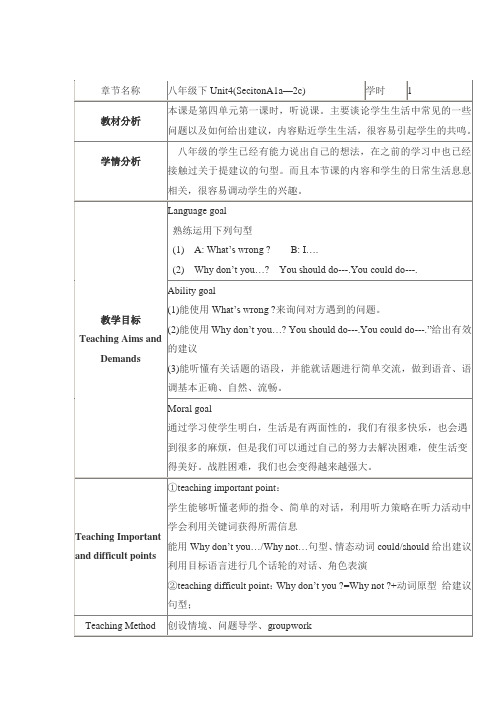
Step 5:Listening活动一、出示听力图片引导学生猜测“Is she happy? What ’s wrong with the girl?” 播放录音 并根据学生完成听力情况调整听力次数 看图片做听力猜测,读1a 句子做好听力准备,核对答案。
活动二、fill in the blanks再次听力,补全朋友给出的建议。
重视听力策略的训练 活动二的设计一方面是根据学生的水平对听力材料难度进行的调整,另一方面也是为了让学生继续感知问题与建议这一话题。
Step 6:Group work If your classmates have some troubles, can you giv e them some advice? Try to give advice in groups. 并进行总结给出建议的几种方式。
小组合作讨论问题并给出恰当的建议,利用小组的作用,调动学生的积极性。
Step 7 :pair work T : There is something wrong with me . can you give me advice?T: Now it ’s your turn. Work in pairs to makea new conversation从师生对话过渡到生生对话,进行目标语言的操练。
Step8: ListeningShow the picture lead in the listening 2a 、2b Look at the picture and guess “What ’s the matter with Peter?”Read the advice that Peter ’s friend gives himand the reason why Peter doesn ’t like theadviceDo listening and Check the answers.通过导入听前活动,做好听力准备,进行听力训练。
Unit 4 知识点总结+单元练习题人教版英语八年级下册(附答案)

人教版英语八年级下Unit 4 Why don’t you talk to your parents?知识点总结+单元练习题(原创+答案)1一.重点词组:1.what’s wrong 哪不舒服?what’s wrong with sb 某人怎么了?2.look through 快速查看,浏览look up 查询look for 寻找look after 照顾look out = watch out 当心3.big deal 重要的事it’s not a big deal 不是要紧的事4.work out = figure out 解决,弄明白5.not...anymore 再也不6.cut out 删去pare...with 比较8.in one’s opinion 在某人看来9.hang out with sb 和某人闲逛10.after-school class 校外辅导课11.get into fight with sb 和某人打起来12.be angry with sb 对某人生气13.why don’t you do = why not do sth 为什么不做某事14.get on with sb 和某人相处得好15.be nice to sb 对某人友好16.mind sb doing sth 介意某人做某事17.on weekends 在周末二.重点单词1.allow v 允许allow doing sth 允许做某事allow sb to do sth 允许某人做某事sb is allowed to do sth 某人被允许去做某事2.guess v/n 猜have a guess = take a guess 猜一猜guess what? 您猜怎么着?3.deal v 处理;n 交易deal with sth 处理... = handle sth4.relation n 关系relative adj 相对的;n 亲戚relationship n 关系be related to sth 与...有关munication n 交流communicate v 交流6.argue v 争吵argue with sb 和某人争吵argument n 论点7.cloud n 云朵clouds 乌云8.instead adv 反而用法1:放在句首使用:She isn’t allowed to go out at this time of night. Instead, she should do her homework in her bedroom.用法2: 放在句尾连起来使用:She isn’t allowed to go out at this time of night. She should do her homework in her bedroom instead.instead of + 名词性短语9.nervous adj 焦虑的be nervous of/about sth10.offer v/n2offer sb sthprovide sth for sb = provide sb with sth supply sth for sb = supply sb with sth 11.proper adj 恰当的improper adj 不恰当的suitable adj 恰当的12.explain v 解释explanation n 解释13.clear adj 清晰的a clear day 晴天crystal clear 一清二楚的14.return v 返回return back 返还return to sb 还给某人15.member n 成员membership n 会员资格16.pressure n (物理)压力release pressure 释放压力stress (精神)压力reduce stress 减少压力pete v 竞争compete against sb 与某人竞争、攀比competition n 比赛competitive adj 竞争激烈的,好竞争的competent adj 有能力的,能胜任的18.skill n 技巧19.typical adj 典型的20.football n 美式橄榄球soccer 英式足球21.continue v 继续22.crazy adj 疯狂的be crazy about sth 对...感到痴狂23.push v 推push-up 俯卧撑pull v 拉24.develop v 发展development n 发展25.cause v 造成;n 原因cause sb to do sth 引起某人去做某事ual adj 平常的as usual 像往常一样27.perhaps adv 或许probably adv 或许possibly adv 或许34Unit 4 单元练习题一.重点词组考察二.重点单词考察三.课文翻译1. I have _____ _____ (太多) homework so I don’t have enough sleep.2. My parent don’t _____ _____ _____(允许我) hang out with my friends.3. I have _____ _____ (太多) after-school classes.4. I _____ _____ (陷入) a fight with my best friend.5. _____ _____ _____ (你为什么不)go to sleep earlier this evening?6. The house is _____ _____ (已经相当) clean and tidy.7. I found my sister _____ _____ (翻找) my things yesterday. 8. I guess you could tell her _____ _____ _____(去道歉).9. My problem is that I can’t _____ _____ _____ (和某人相处) my family. 10. My _____ _____ (大哥) is not very nice to me.11. He always _____ _____(拒绝) let me watch my favorite TV show. 12. It’s not easy _____ _____ _____ (处于你这个年龄). 13. You should _____ _____ _____ (提供去帮助).14. You don’t _____ _____ _____ _____ _____ _____ _____ (介意他一直在看电视).15. My sister borrows my clothes _____ _____ (没有问). 16. I am _____ _____ (担心) my school grades.17. You should tell him that _____ _____ _____ (抄别人的作业) is wrong. 18. _____ _____ _____ (他们中的许多人) are learning exam shills so that they can get into a good high school.19. They are always _____ _____ _____ (把他们和...做对比) other children.四.单项选择1.We can’t take this away until she _____ yes.A.will sayB. sayC. saysD. said2.She finally agrees with us _____ she did not like the plan at the beginning.A.ifB. unlessC. althoughD. when3.---Thanks for your sincere suggestion.---It’s my pleasure. Hope things _____.A.work outB. look outC. try outD. find out4.We are not allowed _____ or drink in the classroom.A.eatB. to eatC. eatingD. eaten5.The little boy _____ his book to the girl.A.providesB. suppliesC. bringsD. offers6.---Young people are always talking on their phones.---Yes, indeed. They should put down their phones and talk to people around them _____.A.stillB. eitherC. tooD. instead7.My _____ sister is three years _____ than me..A.elder; olderB. elder; elderC. older; elderD. older; older8.They didn’t leave for home _____ they finish their work.A.untilB. ifC. unless9.Chinese parents tend to compare their children _____ other kids.A.forB. toC. byD. with10.Do you mind me _____ the radio? It’s too noisy.A.turning upB. turning onC. turning downD. turn down11.Gloria offers _____ us prepare for the exams.A.helpB. to helpC. helpingD. helped12.Did you watch the TV show _____ the evening of August 24th?---Yes, I did. _____ my opinion, it’s wonderful.A.in, InB. in; OnC.on; OnD. on, In五.完形填空As though things weren’t 1._____ enough last spring, a wild turkey started showing up on my block. It’s normally one of the busiest intersections in Minneapolis, but this turkey walked down the sidewalk day after day 2._____ she belonged. As word 3._____ about her, more and more people came out to see her. A young woman told me that they had named her Tina—Tina the Turkey. Tina must have been 4._____ eggs in front of the neighbors’ house. She would sit and wiggle her rump in the same place in their yard every day. One day she walked with five other 5._____ through the parking lot, 6.______ the two-and-a-half-foot cement wall, and into the yard. I watched in surprise—six wild turkeys! One had her feathers ruffled; I think it must have been Tina. This was her 7._____ now. There were many days when Tina would stand in the parking lot—a dangerous place for a 8._____ bird—and refuse to move, blocking cars from coming or going. This became a show with Tina in the starring role until the day a new character appeared on stage: an strange-looking man with black hair. He looked 9._____. He was covered in dirt, his posture stiff. He approached Tina and began to strike curious poses in a beautiful dance. Tina 10._____ him in this dance. Together, they were art in motion. And because of the stay-at-home order, I got to see them. I’ll always remember this turkey when I think back on the corona-virus pandemic. She brought a lot of joy to a community at a time when people desperately needed an escape.1.A. funny B. strange C. wonderful D. humorous2.A. as if B. if C. even if D. even though3.A. gave out B. handed out C. set out D. got out4.A. lying B. laying C. lied D. laid5.A. neighbors B. places C. turkeys D. women6.A. on B. up C. in D. with7.A. place B. turkey C. right D. wall8.A. fat B. strong C. powerful D. slow-moving9.A. homeless B. hopeless C. strange D. careful510.A. embraced B. joined C. welcomed D. invited 答案:一.重点词组1.what’s wrong with sb2.look through3.look for4.big deal5.look out6.work out7.not ... anymore8.cut outpare ... with ...10.hang out with sb11.after-school class12.in one’s opinion13.get into fight with sb14.be angry at sb15.be friendly to/with sb16.on weekends17.sllow doing sth18.allow sb to do sth19.be allowed to do sth20.guess what21.a clear day22.crystal clear23.return back24.return to sb25.be crazy about26.cause sb to do sth27.as usualpete with/against29.help with sth630.reduce stress; release pressure31.be related to32.find sb doing sth二.重点单词1.relation2.relativemunication; communicate4.argument5.clouds6.continue7.anyway8.proper; improper9.sick; ill10.member11.membership12.neighborhood13.typical三.课文翻译1.too much2.allow me to3.too many4.get into5.Why don’t you6.already pretty7.looking through8.to say sorry9.get on with10.elder brother11.refuses to12.being your age13.offer to help14.mind him watching TV all the time15.without asking16.worried about17.copying others’ homework18.Many of thempare them with四.单项选择1-5 CCABD5-10 DAADC11-12 BD五.完形填空1-5 BADBC6-10 BADAB7。
人教版八年级英语下册Unit4Whydon’tyoutalktoyourparents教学设计
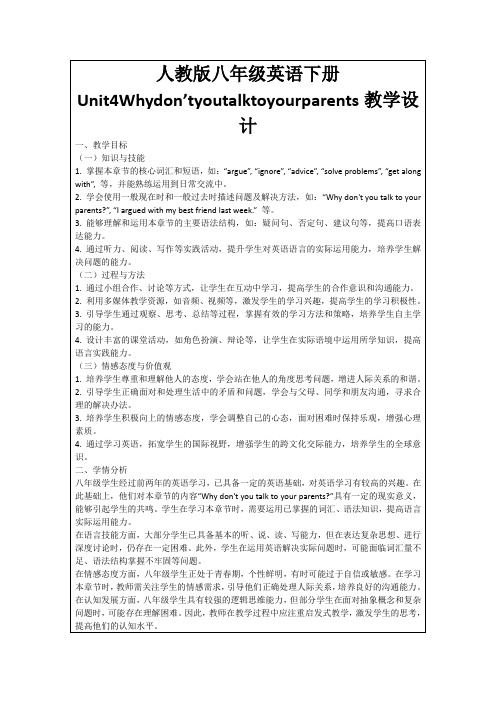
1.教师呈现教材中的对话,引导学生跟读并理解对话内容,掌握核心词汇和短语。
2.教师对一般现在时和一般过去时进行讲解,结合实例句子,让学生观察、分析并总结语法规则。
3.学生跟随教师进行句型替换练习,巩固所学语法知识。
4.教师引导学生关注教材中的问题解决策略,帮助学生学会如何运用英语寻求合理的解决办法。
2.学生观看视频后,教师提出问题:“Do you have any problems communicating with your parents? How do you usually solve these problems?”让学生思考并分享自己的经历。
3.教师根据学生的回答,总结出本节课的主题:“Why don't you talk to your parents?”并板书。
4.通过听力、阅读、写作等实践活动,提升学生对英语语言的实际运用能力,培养学生解决问题的能力。
(二)过程与方法
1.通过小组合作、讨论等方式,让学生在互动中学习,提高学生的合作意识和沟通能力。
2.利用多媒体教学资源,如音频、视频等,激发学生的学习兴趣,提高学生的学习积极性。
3.引导学生通过观察、思考、总结等过程,掌握有效的学习方法和策略,培养学生自主学习的能力。
教学策略:运用角色扮演、小组讨论等形式,激发学生的参与热情,提高课堂互动性。
2.词汇教学:通过例句、图片、故事等多种方式,帮助学生理解和记忆本章节的核心词汇和短语。
教学策略:设计词汇接龙、单词卡片等游戏,让学生在轻松愉快的氛围中学习词汇。
3.语法教学:以问题为导向,引导学生发现和总结一般现在时和一般过去时在句子中的应用规律。
5.课堂延伸:学生观察和思考家庭中的沟通问题,尝试运用所学知识为家庭成员提供沟通建议。将观察到的实例和提出的建议整理成文字,下节课与同学分享。
人教八年级英语下册《Unit4 Why don't you talk to your parents
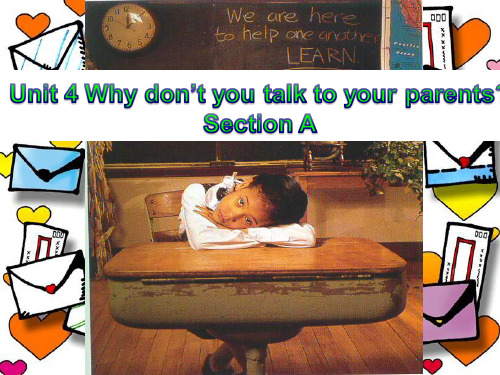
2.有毛病,错误的 4.午夜,子夜 6.猜测,估计 8.重要的事 10.和睦相处,关系良好 12.交流,沟通(n.) 14.云,云朵 16.代替,反而 18.焦虑的,担忧的 20.正确的,恰当的 22.交流,沟通(v.) 24.清楚易懂的,晴朗的 26.归还,回来
1.look through 浏览
He is looking through the books in the library.
look around 四处张望 look up 向上看;查找 look into 调查 look after 照顾;照看 look at 看看 look for 寻找
2 .Although she’s wrong , it’s not a big deal. 尽管她做得不对,但也没什么大不了的。 although 引导让步状语从句 虽然;尽管 big deal 重要的事情或状况 It is not a big deal.= It is no big deal. deal n. 协议;交易 n.大量 a good / great deal (of sth) vi.处理;应对 deal with
3 Hope things work out. 希望事情会好起来。 work out解决(问题)改善(状况)
Do you want to stay with us to see how things work out?
1.用功学习
2.得到足够的睡眠
人教版八年级英语下册Unit 4 Why don't you talk to your parents教学设计

Share their answers.
2. 2a
First get the students to read the instruction and understand the means of could and should.
Then get them to listen and fill in the blanks.
(2) 2d : Role play the conversation.
Answer the following questions:
1) Why did Kim look sad?
2) Does Kim’s sister return his new magazines and CDs?
3) What did Kim think of his sister?
1)words 2)phrases 3) sentences
2.当堂检测(见学案):教师要随堂进行评价,批改可以由学习小组内互批、组间互批、集体订正等方法,批阅后教师要统计达标情况,收集反馈信息,当堂矫正补救。
VI. Assignment
作业
1.口头作业:听并跟读录音,编对话,背笔记。
2.书面作业:
3.能熟练掌握并使用下列重点句式:
A: What’s wrong?
B: I’m really tired because I studied until midnight last night.
人教版八年级英语下册集体备课教案:Unit4 Why don’t you talk to your

课题课时Period 1教学目标语言技能听:能听懂他人他人陈述困难和麻烦的简单对话的内容,并获取主要信息。
说:1.能询问、陈述自己或他人的困难和麻烦,如What’s wrong?I’m really tired because I studied until midnight last night.2.能针对别人的困境提出解决的办法和建议,如What should Ido?Well,you should call him so that you can say you’re sorry.语言知识语音:熟练把握邀请句的升调语调,同时,在口语交流时能做到语音、语调准确、自然、流畅。
词汇:1.熟练运用:allow,wrong,midnight,guess,de al.2.掌握:What’s wrong, look through,work out.语法:1.能正确使用情态动词could,should表达或劝告,如:Youcould go to his house.2.能正确使用Why don’t you...?句型表达建议。
功能:学会询问、陈述自己或他人的困难和麻烦。
话题:了解人际交往的相关知识。
情感态度1.培养学生用英语交际能力,学会与人进行流畅的沟通和交流;2.使学生在活动中学会真诚、坦然地与人交谈。
学习策略认知策略:能在具体的情境中询问、陈述自己或他人的困难和麻烦,从而进一步主动练习和实践。
调控策略:.能针对别人的困境提出解决的办法和建议,并与人进行交流。
交际策略:培养学生合作能力,不断完善知识点,加强对话练习,学会与人闲聊,进行交流。
资源策略:通过多媒体、录音机等教学辅助工具。
文化意识了解中西方家长对待孩子参加课外活动和课外学习班的态度与做法。
教学重难点教学重点1.能正确使用情态动词could,should表达或劝告。
2.能正确使用Why don’t you...?句型表达建议。
教学难点1.Talk about problems.2.Give advice.教学方法听说法,交际法,教学辅助手段PPT, recorder.板书设计Unit4 Why don’t you talk to your parents?Sectio n A 1a-2dallow What’s wrong?wrong Why don’t you...?midnightguessdeal教后反思本节课学会了提建议的方式有:Why don’t you...? /Why not…?等Teaching ProcedureStages/TimingStep 1. warming-upStep 2 PresentationStep3 DiscussionStep 4Pre sentationStep 5 ListeningTeach ers’ a ctivitiesAfter greeting, ask students :What day is it today?What’s the date today?What’s the weather like today?1. Show the picture of a girl:T: Please look at this girl,what isshe doing?T: Look at her face,she isworried.because she has a lotof homework to do.Do yo uhave too much homework todo?Do you think it is serious?1a.Get them to read the followingsentences and discuss wheatherthey are serious or not. And thenwrite them in the approprite boxT:Do you have theseproblems?What kind of problemsdo you have?Students’ activitiesStudents answer the questions。
Unit 4 Why don’t you talk to your parents人教版八年级下英语
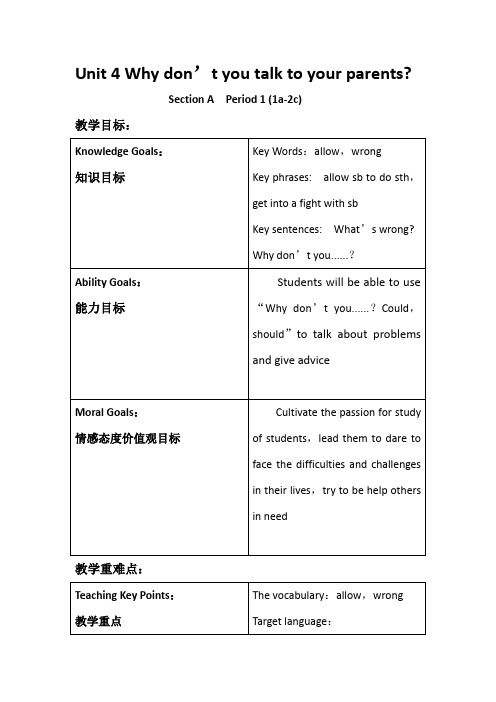
Unit 4 Why don’t you talk to your parents?
Section A Period 1 (1a-2c)
教学目标:
教学重难点:
Teaching Steps:教学环节
一.第一教学环节:情景导入(约5分钟)
二.第二教学环节:师生互动(约30分钟)
三.第三教学环节:协作学习(约9分钟)
四.第四教学环节:布置作业(约1分钟)
板书设计:
Unit 4 Why don ’t you talk to your parents?
Section A Period 1 (1a-2c)
课后反思:
本节课主要通过对于生活中所存在的问题进行探讨并给出建议,引导学生掌握提出建议的三种基本句型,锻炼学生的听说读写能力,并提高学生的社会关注度和社会责任感。
在实际操作过程中,我的时间把握不是太好,导入环节过长,设置的问题不够精炼,导致后来的听说环节有些仓促,另外就是问题设置难度较大,学生不知如何让表达,导致课堂的氛围略显沉闷,最后的拓展升华有些突兀,过渡不够自然,没有达到理想的效果,这都是我在以后的课堂教学过程中需要改进的地方。
新人教版八年级英语下册Unit 4 Why don’t you talk to your parents 说课稿、教学设计及教后反思

Unit 4 Why don’t you talk to your parents? 说课稿一、教材分析(一)教材的地位和作用本课的中心话题是谈论同学们生活及学习中的问题和困难并提出合适的建议,从而展开教学活动。
学习本课的内容为整个单元打下基础,同时也是英语教学中拓展学生思维的重要环节。
(二)教学目标的确立和依据根据《新课程标准》的要求,为了完成正常的教学任务,有效地培养学生的自信,创新精神和合作互助的能力,我确立如下的教学目标:1、语言知识:学生能够使用以下词汇:too much, enough, allow, hang out, fight,wrong, midnight.句型:----What’s wrong?----I have to study too much so I don’t get enough sleep. ----Why don’t you talk to your parents?2、语言技能:(1)学完本课,让学生学会用英语说出学习和生活中的问题和困难,并能根据别人的问题给出合适的建议。
(2)能运用所学单词、短语及句型,结合实际生活进行灵活运用。
3、学习策略:(1)自主学习:要求学生采用自主学习的方式,能根据需要进行有目的的预习。
(2)合作学习:在活动中相互探讨,相互交流与合作,从而获得知识、技能和情感体验。
4、情感态度:(1)通过说出自己学习和生活中的问题和困难,让同学们学会释放压力,增加自信,热爱生活。
(2)通过给别人提建议,培养学生团结互助的精神,增进同学之间的感情。
5、文化意识:(1)了解中西方文化差异:我们比较委婉,而西方人则更直接一些,对学生进行不同文化意识的渗透。
(三)教学重点和难点:1.重点:让学生用英语说出学习和生活中的问题和困难,并且给出别人一些合适的建议,注意提建议的句型及用法和建议形式的多样化。
2.难点:用英语给出合适的建议是一大难点,词汇和短语搭配等基本功要扎实。
新版人教版初中英语八年级下册 Unit 4 Why don't you talk to your parents?课件

elder brother
isn’t nice feels _la_o_nndely nervous
Why don’t you talk about these feeling with your family?
ReadIftyhoeurspeacroenntds alreethtaevrinagnpdroblems, undeyroluinseho(划uld线off)erthtoehelp. senteMnacyebse yaobu ocouutldMdorm. oHreujonbts’asround advicthee thooueseascohthpatrtohebylheamve.more time
he_w__a_tc_h_e_s_whatever he wants _u_n__ti_l late at night
feels _l_o_n_e_l_y_and_n_e_r_v_o_u_s_
/ˈnɜ:vəs/adj. worried 焦虑的
Hale Waihona Puke can’t get on with his family
Tip 3 : Skim the article quickly and find the main idea. 找寻文章大意。
/kəˌmju:nɪˈkeɪʃn/n.
the activity of talking交流
parents _f_ig_h_t_ a lot can’t g_e_t_o__n_w__it_h his family
Watch the video and think about the following questions. 1. What is Eddy’s day like?
人教版英语八年级下册Unit 4 Why don’t you talk to your parents课文知识点总结

2019-2020学年人教版英语八年级下册Unit 4 Why don’t you talk to your parents?课文知识点总结Section A1.Why don’t you talk to your parents? 你为什么不和你打父母谈谈呢?【解析】Why don't you do sth ?= Why not do sth? 为什么不......呢?【拓展】用于提建议的句型有:(1)What about doing sth ?=How about doing sth? ….怎么样?(2)Why don’t you do sth?= Why not do sth? 为什么不呢?(3)Let’s do sth.让我们一起做某事吧。
(4)Shall we/I do sth?我们做…好吗?(5)had better do/not do sth 最好做/不做某事(6) Will/Would you please do sth 请你做…好吗?(7) Would you like to do sth? 你想去做某事吗?(8)Would you mind doing sth?你介意做某事吗?【回答】(1). 同意对方的建议时,一般用:◆Good idea./ That’s good idea. 好主意◆OK/ All right./ Great 好/ 行/太好了◆Yes, please ./ I’d love to 是的/ 我愿意◆I agree with you 我同意你的看法◆No problem 没问题◆Sure/ Of course/ Certainly 当然可以◆Yes, I think so 对,我也这样想(2).对对方的帮助或要求表示委婉谢绝时,一般用:◆I don’t think so 我认为不是这样◆Sorry, I can’t 对不起,我不能◆I’d love to, but…◆I’m afraid…我愿意,但恐怕……2.I have to study too much so I don’t get enough sleep.我要学的太多,因此我睡眠不足。
人教版八年级英语下册Unit4Whydon’tyoutalktoyourparents单元教学设计

四、教学内容与过程
(一)导入新课,500字
在导入环节,教师可以通过与学生谈论家庭生活中的小问题,激发学生的兴趣,为新课的学习做好铺垫。
教师提问:“Do you have any problems in your family life? Can you share one of them with us?”(你在家庭生活中遇到过什么问题吗?你能和我们分享一个吗?)
(2)选取一段与本单元主题相关的英语对话,进行模仿跟读,注意模仿语音、语调,提高口语表达能力。
2.阅读作业:
阅读课后文章,回答相关问题,锻炼提取关键信息、概括文章主旨的能力。同时,关注文章中出现的重点词汇和句型,进行积累和复习。
3.口语作业:
结合本单元所学,与家人或朋友进行一次关于家庭生活问题的英语对话,尝试用所学句型和时态提出建议和解决方案,将对话过程录音,以便在课堂上分享。
(2)教师邀请学生上台演示,运用一般现在时和现在进行时描述问题。
3.学生跟读并模仿,巩固所学知识。
(三)学生小组讨论,500字
1.教师将学生分成小组,每组讨论一个家庭生活中常见的问题。
要求学生运用所学句型和时态,提出解决问题的建议。
2.各小组派代表分享讨论成果。
教师引导学生互相评价,关注语言表达的准确性和合理性。
难点:如何帮助学生克服对长篇文章的恐惧,提高阅读效率和理解程度。
3.重点:培养学生的跨文化交际意识,了解不同文化背景下的沟通方式。
难点:如何让学生在实际交流中,尊重文化差异,运用恰当的交际策略。
(二)教学设想
1.针对重难点,采用以下教学策略:
(1)情境教学法:通过设定各种真实语境,让学生在角色扮演、情景模拟等活动中,学会运用一般现在时和现在进行时描述问题和提出建议。
八年级英语下册Unit4Whydon’tyoutalktoyourparents-知识点整理
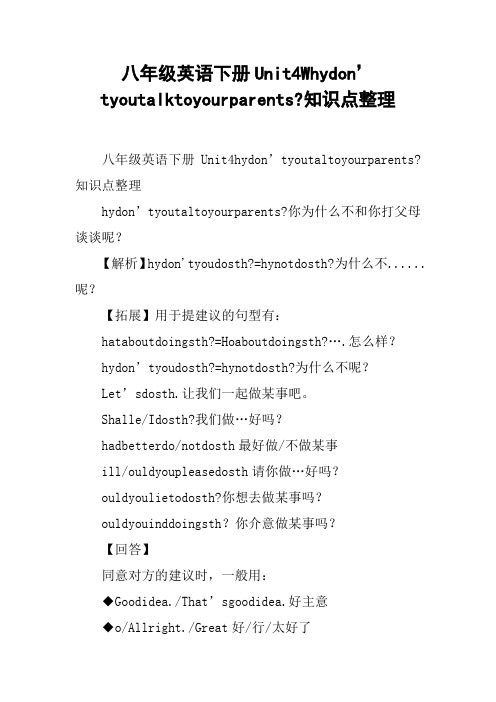
八年级英语下册Unit4Whydon’tyoutalktoyourparents?知识点整理八年级英语下册Unit4hydon’tyoutaltoyourparents?知识点整理hydon’tyoutaltoyourparents?你为什么不和你打父母谈谈呢?【解析】hydon'tyoudosth?=hynotdosth?为什么不......呢?【拓展】用于提建议的句型有:hataboutdoingsth?=Hoaboutdoingsth?….怎么样?hydon’tyoudosth?=hynotdosth?为什么不呢?Let’sdosth.让我们一起做某事吧。
Shalle/Idosth?我们做…好吗?hadbetterdo/notdosth最好做/不做某事ill/ouldyoupleasedosth请你做…好吗?ouldyoulietodosth?你想去做某事吗?ouldyouinddoingsth?你介意做某事吗?【回答】同意对方的建议时,一般用:◆Goodidea./That’sgoodidea.好主意◆o/Allright./Great好/行/太好了◆yes,please./I’dloveto是的/我愿意◆Iagreeithyou我同意你的看法◆Noproble没问题◆Sure/ofcourse/certainly当然可以◆yes,Ithinso对,我也这样想对对方的帮助或要求表示委婉谢绝时,一般用:◆Idon’tthinso我认为不是这样◆Sorry,Ican’t对不起,我不能◆I’dloveto,but…◆I’afraid…我愿意,但恐怕……【XX天津4】35.—hynotgotoLaoSheTeahousetonight?—______.A.Itdoesn'tatterB.Thanyouc.SorrytohearthatD.Soundsg reat【XX广东广州4】25.—Ifeelreallytired.—______A.Lucyyou!B.you’dbetterorharder.c.congratulations!D.hynotgoandhavea rest?【XX四川凉山3】37.—It’saniceday,isn’tit?—yes.______goinghiingandrelaxourselves?A.hynotB.hydon’tc.hatabout【XX湖南益阳】youlootootired.hynot_____arest?A.StoptohaveB.tostop havingc.stophavingIhavetostudytoouchsoIdon’tgetenoughsleep.我要学的太多,因此我睡眠不足。
- 1、下载文档前请自行甄别文档内容的完整性,平台不提供额外的编辑、内容补充、找答案等附加服务。
- 2、"仅部分预览"的文档,不可在线预览部分如存在完整性等问题,可反馈申请退款(可完整预览的文档不适用该条件!)。
- 3、如文档侵犯您的权益,请联系客服反馈,我们会尽快为您处理(人工客服工作时间:9:00-18:30)。
Unit 4 Why don’t you talk to your parents?重点短语1. get enough sleep 有足够的睡眠2. have free time to do things I like有自由时间做我喜欢做的事have free time to do sth. 有空闲的时间做某事have no free time to do sth.=don’t have any free time to do sth. 没有空闲的时间做某事3.too much +不可数名词太多……too many +名词复数much too +形容词/副词太……4.so 的用法(1)so that 以便于(2)so…that 如此...以至于(3)so(连词):“所以,因此”Eg: My room is dirty, so I will clean it.(4)so(连词):“那么”,用来连接句子或上下文,相当于andEg: So how much is the book? 那么这本书多少钱?(5)so(副词):“这样,如此”,代替上文出现的内容Eg: -I think English is interesting.-I think so.(6)so(副词):“那么,如此地”,修饰形容词或副词Eg: I was so happy.5.(1)allow sb to do sth 允许某人做某事(2)be allowed to do sth. 被允许做某事(3)allow sb not to do sth 不允许某人做某事eg:My parents don't allow me to hang out. =I’m not allowed to hang out.(4)allow doing sth. 允许做某事(allow后面不接sb, 则用doing)(5)allow for 考虑到allow of 容许有……的可能(6)allowance(n.)津贴,补助;allowable(adj.)许可的,可承认的6.take/ have after-school classes参加课后辅导班7.get into a fight with sb. 与某人吵架/打架=have a fight with sb. =fight with sb.8.what's wrong? =what's the matter/ trouble/ problem?怎么了?9.go to sleep earlier 早点睡觉10.until midnight直到半夜11.write sb. a letter= write a letter to sb.给某人写信12.call sb. up与某人交谈13.take him to the ball game带他去参加球类比赛take...to... 把...带到...14.wait that/ so long等待如此久15.①surprise sb. 令某人惊讶②to one’s surprise令某人吃惊的是③in surprise 吃惊;惊讶16.look through浏览;透过……看去look after照顾;照看;look for寻找;look out小心;look into调查;look out of向……外看look over仔细检查;look up 查阅;look like看起来像;look the same看起来一样look up向上看,查单词;look around环视;look forward to期望17.find sb. doing something发现某人正在做……18.give something back to somebody=return sth. to sb.= return sb. sth. 归还某物给某人19.be angry with sb. 生某人的气make sb.angry 使某人生气be angry at/about sth. 因某人所说的话或所做的事生气20.deal(1)n. 交易,协议a big deal重要的事make a deal with…和……达成协议,和……妥协(2)v. 处理,交易,分配deal with 处理21.work out 解决;成功地发展work on 致力于22.get on with sb.= get along with sb.和某人和睦相处;关系良好:get on well with sb.= get along well with sb. 和某人相处得好23.relations between my parents我父母之间的关系(1)in relation to 关于,涉及(2)A good friend is my nearest relation. 良友如近亲。
24.(1)argue (v.) with sb.与某人争吵=have an argument (n.) with sb.(2)argue with sb. about sth. 为某事和某人争吵(3)argue for 赞成(4)argue over 辩论某事,为……争吵25.hang over 笼罩,挂在……上面;继续;搁置有待解决Eg: A lamp hangs over the table. 一盏灯悬挂在桌子上。
I expect the meeting to hang over till 6 o’clock. 我希望会议持续到6点。
We’ll take up the business that hung over from last meeting. 我们将讨论上次会上遗留的问题26.elder brother哥哥(1)elder 表示“前辈的,年级较长的”,仅用于同于同一家庭的成员比较。
在句中只能做定语,且只能修饰人(2)older 使用范围较广,可做定语也可做表语,可修饰人也可修饰物27.refuse to do sth. 拒绝做某事refuse sb. sth. 拒绝某人某事28.instead (adv.) 代替,反而;却①可单独使用,常用于句首或句末。
①instead of sb.代替某人③instead of doing代替做某事te at night 深夜30.feel lonely and nervous感到孤独和焦虑31.offer to do sth.主动提出做某事offer sb. sth.=offer sth. to sb. 向某人提供某物provide sb. with sth.=provide sth. for sb. 主动向某人提供某物32.do more jobs around the house多做家务municate with sb.和某人交流34.agree/ disagree with sb. 同意/不同意某人35.explain sth. to sb.=explain to sb. sth. 向某人解释某事36.borrow my clothes without asking 没问一声借我的衣服37.worry①worry about sth.①be worried about sth担心某事.38.all the time 一直;反复39.be afraid of doing=be afraid to do害怕做某事40.not…anymore不再(多指次数上的“不再”)41.be oneself做自己42.copy(1)v. 抄袭,模仿,复制,复印copy my homework 抄袭我的作业copy down 抄下来,记下来(2)n. 复制品,一份43.family members 家庭成员44.spend time alone独自消磨时光45.give sb. a lot of pressure给某人施加很大的压力pete with sb.与某人竞争compete for sth. 争夺某物,为争夺某物而比赛compete to do sth. 争做某事47.each other 彼此;互相48.①practice sports 体育训练②practice doing 练习做某事49.cut out删除cut up 切碎;cut down 砍到,削减;cut in 插嘴,插入;cut off 切断(水、电)供应50.①It’s time for sth. 到了该做某事的时间②It’s time for sb. to do sth.It’s time for homework.= It’s time to do homework.51.all kinds of 各种各样的pare A with B 把A与B相比较Eg.My parents are always comparing me with other kids .(1)compare…with…把……与…..做比较(2) compare…to…把…..比做……53. be good for 对……有利be good at =do well in擅长于be good with和某人相处得好54.cause a lot of stress 造成很大压力55. ①want them to be successful 想让他们成功①want successful children 想要成功的孩子56.keep on doing sth. 持续做某事57.continue to do sth 继续做另一件事/continue doing sth继续做刚才做的事58.It’s +adj. +for sb. to do 对某人来说做某事怎么样It’s important for kids to join after-school activities.对孩子们来说参加课外活动是重要的59.What do you think of…? =How do you like…? 你认为……怎么样?60.①in one’s opinion 在某人来看②give one’s opinion提出某人的观点61.speak to me 跟我讲话62.①tell sb. to do 告诉某人做某事②turn down 关小;调低③tell him to turn down the TV 告诉他关小电视63.learn exam skills 学习应试技巧64.be nervous about 对...感到紧张65.mind sb. doing sth. 介意某人做某事66.be crazy about…热衷于go crazy发疯;失去理智be crazy for.渴望…;对……疯狂67.push(v.)鞭策,督促,推动(1)反义词pull(v.)拉过来(2)pushy(adv.)固执己见的(3)push over推倒;推翻push on继续前进(或进行活动)push ahead推行(计划)push through(使)穿过;使得到批准push back把……向后推;推迟重点语法1.表达建议(1)Why don’t you do sth?=Why not do sth.? 你为什么不……呢?(2)How/What about doing sth.? 做某事怎么样?(3)Let’s do sth. 让我们做某事吧(4)You’d better do/not do sth. 你最好做/不做某事(5)Shall we do sth.? 我们做某事好么?(6)You should/could do sth. 你应该/可以做某事(7)Would you like to do sth? 你想去做某事吗?2.回答(1)同意对方的建议时,一般用:* Good idea./ That’s good idea. 好主意*OK/ All right./ Great 好/ 行/太好了* Yes, please ./ I’d love to 是的/ 我愿意* I agree with you 我同意你的看法* No problem 没问题*Sure/ Of course/ Certainly 当然可以*Yes, I think so 对,我也这样想(2)对对方的帮助或要求表示委婉谢绝时,一般用:* I don’t think so 我认为不是这样*Sorry, I can’t 对不起,我不能*I’d love to, but…* I’m afraid…我愿意,但恐怕……3.although,so that,until(1)until作连词意为“直到……时”。
